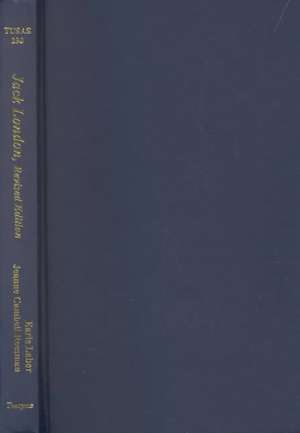United States Authors Series: Jack London, REV. Ed.: Twayne's United States Authors, cartea 0230
Autor Earl Labor, Earle Labor Jeanne Campbell Reesmanen Limba Engleză Hardback – 30 iun 1994
Devoted to critical interpretation and discussion of an author's work, each study takes account of major literary trends and important scholarly contributions and provides new critical insights with an original point of view. An Authors Series volume addresses readers ranging from advanced high school students to university professors. The book suggests to the informed reader new ways of considering a writer's work.
Each volume features:
-- A critical, interpretive study and explication of the author's works
-- A brief biography of the author
-- An accessible chronology outlining the life, the work, and relevant historical context
-- Aids for further study: complete notes and references, a selected annotated bibliography and an index
-- A readable style presented in a manageable length
Din seria Twayne's United States Authors
-
 Preț: 462.02 lei
Preț: 462.02 lei -
 Preț: 462.79 lei
Preț: 462.79 lei -
 Preț: 460.29 lei
Preț: 460.29 lei -
 Preț: 314.33 lei
Preț: 314.33 lei -
 Preț: 464.15 lei
Preț: 464.15 lei -
 Preț: 466.27 lei
Preț: 466.27 lei -
 Preț: 375.22 lei
Preț: 375.22 lei -
 Preț: 373.47 lei
Preț: 373.47 lei -
 Preț: 374.45 lei
Preț: 374.45 lei -
 Preț: 461.64 lei
Preț: 461.64 lei -
 Preț: 461.48 lei
Preț: 461.48 lei - 23%
 Preț: 453.23 lei
Preț: 453.23 lei -
 Preț: 464.36 lei
Preț: 464.36 lei -
 Preț: 375.22 lei
Preț: 375.22 lei -
 Preț: 463.93 lei
Preț: 463.93 lei -
 Preț: 465.13 lei
Preț: 465.13 lei -
 Preț: 372.71 lei
Preț: 372.71 lei -
 Preț: 377.34 lei
Preț: 377.34 lei -
 Preț: 374.84 lei
Preț: 374.84 lei -
 Preț: 373.85 lei
Preț: 373.85 lei -
 Preț: 485.68 lei
Preț: 485.68 lei -
 Preț: 506.67 lei
Preț: 506.67 lei -
 Preț: 375.00 lei
Preț: 375.00 lei -
 Preț: 375.00 lei
Preț: 375.00 lei -
 Preț: 375.98 lei
Preț: 375.98 lei -
 Preț: 462.79 lei
Preț: 462.79 lei -
 Preț: 375.98 lei
Preț: 375.98 lei -
 Preț: 372.93 lei
Preț: 372.93 lei -
 Preț: 378.48 lei
Preț: 378.48 lei -
 Preț: 373.70 lei
Preț: 373.70 lei -
 Preț: 375.39 lei
Preț: 375.39 lei -
 Preț: 463.77 lei
Preț: 463.77 lei -
 Preț: 300.84 lei
Preț: 300.84 lei -
 Preț: 374.45 lei
Preț: 374.45 lei -
 Preț: 486.66 lei
Preț: 486.66 lei -
 Preț: 373.47 lei
Preț: 373.47 lei -
 Preț: 374.07 lei
Preț: 374.07 lei -
 Preț: 467.42 lei
Preț: 467.42 lei -
 Preț: 376.95 lei
Preț: 376.95 lei -
 Preț: 373.85 lei
Preț: 373.85 lei -
 Preț: 374.07 lei
Preț: 374.07 lei -
 Preț: 485.51 lei
Preț: 485.51 lei -
 Preț: 376.95 lei
Preț: 376.95 lei -
 Preț: 373.47 lei
Preț: 373.47 lei -
 Preț: 483.60 lei
Preț: 483.60 lei -
 Preț: 485.51 lei
Preț: 485.51 lei -
 Preț: 487.42 lei
Preț: 487.42 lei -
 Preț: 487.04 lei
Preț: 487.04 lei
Preț: 464.92 lei
Nou
88.97€ • 93.31$ • 74.06£
Carte indisponibilă temporar
Specificații
ISBN-10: 0805740333
Pagini: 208
Dimensiuni: 148 x 224 x 22 mm
Greutate: 0.4 kg
Ediția:Revised
Editura: Twayne Publishers
Seria Twayne's United States Authors
